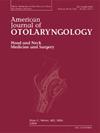pT3-4N0M0大唾液腺癌的辅助放疗无其他不良表现
IF 1.7
4区 医学
Q2 OTORHINOLARYNGOLOGY
引用次数: 0
摘要
目的探讨未发现其他不良病理特征的pT3-4N0M0型大涎腺癌(MSGC)患者辅助放疗(aRT)的使用及总生存期(OS)的差异。方法查询2006 - 2018年国家癌症数据库中分类为pT3-4N0M0的MSGC患者。排除有淋巴血管侵犯或手术切缘阳性证据的患者。采用多变量二元logistic和Cox回归模型,对患者人口统计学、病理特征(包括组织学)和治疗进行调整。结果897例符合纳入标准的患者中,368例(41.0%)接受了aRT治疗。与未接受抗逆转录病毒治疗的患者相比,接受抗逆转录病毒治疗的患者更年轻(中位[IQR] 61[49-72]对67[53-78]岁),并且更频繁地发生腺样囊性癌(AdCC)(18.2%对10.4%)和高级别疾病(33.7%对21.6%)(P <;0.001)。在多变量二元logistic回归中,诊断年龄(aOR 0.98, 95% CI 0.97-0.99)和黑人种族(aOR 0.50, 95% CI 0.32-0.77)与接受aRT的几率降低相关(P <;0.005);AdCC (aOR 2.58, 95% CI 1.54-4.32)、高分级(aOR 1.81, 95% CI 1.04-1.98)、pT4分型(aOR 1.43, 95% CI 1.04-1.98)和颈夹层(aOR 1.41, 95% CI 1.05-1.90)与风险增加相关(P <;0.05)。接受抗逆转录病毒治疗的患者5年OS高于未接受抗逆转录病毒治疗的患者(82.9% vs 67.0%, P <;0.001)和多变量Cox (aHR 0.50, 95% CI 0.37-0.66, P <;0.001)分析。结论约40%的pT3-4N0M0 MSGC患者使用art治疗,无其他不良病理特征的证据。aRT与较高的OS相关,强调了继续努力促进指南推荐的护理的必要性。证据水平:无其他不良病理特征证据的严重唾液腺癌是一种罕见的、中等风险的疾病类别,根据组织病理学、医生和患者的偏好,治疗策略存在很大差异。我们对这类疾病的研究表明,辅助放疗与更高的5年总生存率相关。本文章由计算机程序翻译,如有差异,请以英文原文为准。
Adjuvant radiotherapy in pT3–4N0M0 major salivary gland Cancer without other adverse features
Objective
To investigate adjuvant radiotherapy (aRT) utilization and associated differences in overall survival (OS) in pT3–4N0M0 major salivary gland cancer (MSGC) without evidence of other adverse pathologic features.
Methods
The 2006 to 2018 National Cancer Database was queried for patients with MSGC classified as pT3–4N0M0. Patients with evidence of lymphovascular invasion or positive surgical margins were excluded. Multivariable binary logistic and Cox regression models adjusting for patient demographics, pathologic features including histology, and treatment were implemented.
Results
Of 897 patients satisfying inclusion criteria, 368 (41.0 %) underwent aRT. Compared with those not undergoing aRT, patients undergoing aRT were younger (median [IQR] 61 [49–72] vs. 67 [53-78] years) and more frequently had adenoid cystic carcinoma (AdCC) (18.2 % vs. 10.4 %) and high-grade disease (33.7 % vs. 21.6 %) (P < 0.001). On multivariable binary logistic regression, age at diagnosis (aOR 0.98, 95 % CI 0.97–0.99) and Black race (aOR 0.50, 95 % CI 0.32–0.77) were associated with decreased odds of undergoing aRT (P < 0.005); AdCC (aOR 2.58, 95 % CI 1.54–4.32), high grade (aOR 1.81, 95 % CI 1.04–1.98), pT4 classification (aOR 1.43, 95 % CI 1.04–1.98), and neck dissection (aOR 1.41, 95 % CI 1.05–1.90) were associated with increased odds (P < 0.05). Patients undergoing aRT had higher 5-year OS than those not undergoing aRT on Kaplan-Meier (82.9 % vs. 67.0 %, P < 0.001) and multivariable Cox (aHR 0.50, 95 % CI 0.37–0.66, P < 0.001) analyses.
Conclusion
aRT was utilized in approximately 40 % of patients with pT3–4N0M0 MSGC without evidence of other adverse pathologic features. aRT was associated with higher OS, highlighting the continued need for efforts promoting guideline-recommended care.
Level of evidence
4
Lay summary
pT3–4N0M0 major salivary gland cancer without evidence of other adverse pathologic features represents a rare, moderate-risk disease category with high variation in treatment strategies depending on histopathology and physician and patient preferences. Our study of this disease category suggests that adjuvant radiotherapy is associated with higher 5-year overall survival.
求助全文
通过发布文献求助,成功后即可免费获取论文全文。
去求助
来源期刊

American Journal of Otolaryngology
医学-耳鼻喉科学
CiteScore
4.40
自引率
4.00%
发文量
378
审稿时长
41 days
期刊介绍:
Be fully informed about developments in otology, neurotology, audiology, rhinology, allergy, laryngology, speech science, bronchoesophagology, facial plastic surgery, and head and neck surgery. Featured sections include original contributions, grand rounds, current reviews, case reports and socioeconomics.
 求助内容:
求助内容: 应助结果提醒方式:
应助结果提醒方式:


